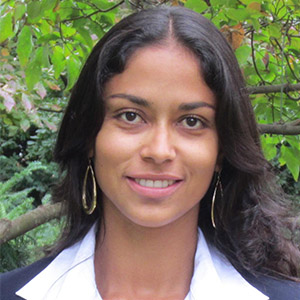Prof.
Jaqueline Oliveira (Ph.D., Yale University) is Assistant Professor of Economics at Rhodes College. Her
dissertation was entitled “Intergenerational Transfers, Fertility,
and Human Capital.” Before she joined Rhodes College, she was an
Assistant Professor at Clemson University where she taught Introduction to
Econometrics and Family Economics. Her research interests include topics
in Development Economics, Labor Economics, Family Economics, and
Urban Economics.

A lot of your research focuses on family economics. On the subject of “family economics,” based on your experience, would you recommend having more than one economist in one’s own family? (In my blogging, I have noticed that economists are often married to other economists.)

A lot of your research focuses on family economics. On the subject of “family economics,” based on your experience, would you recommend having more than one economist in one’s own family? (In my blogging, I have noticed that economists are often married to other economists.)
Gary
Becker--the1992 Nobel prize winner--studied how individuals in the
“marriage markets” decide whether and whom to marry, as well as how the
attributes of potential marriage partners affect these choices. One of
the insights from his research, which helps explain the phenomenon you
just described, is that one stands to gain more from forming
partnerships with someone like them (“equals attract”) because some
traits are complements in the production of “marital happiness”, not
substitutes. Having a husband who is also an economist has many perks.
We can laugh at each other’s nerdy jokes (he knows why it is funny to
have a hat with the Greek letter Beta on it; even funnier if the hat
happens to be BLUE); rant about Trump’s misguided economic policies (tax
on Mexican avocados to pay for a border wall?? really??); share ideas
on how to teach the Intro to Economics class (especially if you happen
to work at the same school).
You
have taught and studied at big schools and smaller schools, public
schools and private schools, and in the U.S. and in Brazil. What
differences have you seen in these different places when it comes to
studying and teaching economics?
College
in Brazil is mostly vocational. Unlike in the U.S., students must
decide for a major before taking the admissions exams (normally at the
age of 17), and spend all of the four years of college focusing on that
major. The upside, in my opinion, is that students graduate with a more
in-depth and technical grasp of their field. The downside is that,
unlike in the U.S., students do not enjoy the freedom to choose classes
and explore interests in other areas of knowledge. Another striking
difference is the transition to graduate school. In Brazil, it is common
for students to spend two years pursuing a Master’s degree before a
Doctorate degree. In the U.S., the norm if for students to start their
Ph.D. studies after finishing college.
As
for private versus public school, my impression is that there is not a
marked difference between those types in the U.S., particularly when it
comes to graduate school. In Brazil, the best economics graduate schools
are private.
Finally, I personally
did not feel a big difference between teaching economics at Clemson and
Rhodes College. While I do enjoy the smaller class sizes at Rhodes, I
think the challenges and rewards that come with teaching are basically
the same.
Do you have any advice for an aspiring economist like me?
My
advice for anyone thinking about pursuing a career in economics is to
consider a Ph.D. degree. I do not think I really understood the power of
economics as a framework with which to think about the world, and the
vast array of interesting and relevant issues it could address, until I
became a Ph.D. student. And with that in mind, I would recommend taking
(and excelling at) as many mathematics and statistics classes as one can
while in college. Admission into Ph.D. programs has become increasingly
competitive over the years. It is important to figure out what it takes
to build a strong application and take the necessary steps early on to
enhance the chances of being accepted into a good program.








